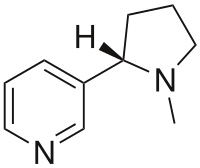
Photo from wikipedia
Binge eating disorder (BED) is a mental illness characterised by recurrent binge eating episodes in the absence of appropriate compensatory behaviours. Consequently, BED is strongly associated with obesity. The current review… Click to show full abstract
Binge eating disorder (BED) is a mental illness characterised by recurrent binge eating episodes in the absence of appropriate compensatory behaviours. Consequently, BED is strongly associated with obesity. The current review aims to provide an update of the most relevant aspects of BED (e.g., clinical profile, aetiology and treatment approaches), in order not only to facilitate a better understanding of the disorder and its clinical consequences, but also to identify potential targets of prevention and intervention. Patients with BED often present high comorbidity with other medical conditions and psychiatric disorders. Numerous risk factors have been associated with the development and maintenance of the disorder. Moreover, although some treatments for BED have proven to be effective in addressing different key aspects of the disorder, the rates of patients that have ever received specific treatment for BED are very low. The factors involved and how to implement effective treatments will be discussed for the purpose of addressing the eating symptomatology and comorbid obesity. Die Binge-eating-Störung (BES) ist eine psychische Erkrankung, die durch wiederkehrende Essanfälle und das Fehlen eines angemessenen Kompensationsverhaltens gekennzeichnet ist. In der Folge besteht eine starke Assoziation mit Adipositas. Der vorliegende Beitrag bietet eine aktuelle Übersicht zu den wichtigsten Gesichtspunkten von BES, unter anderem zu klinischem Bild, Ätiologie und Behandlungsansätzen. Ziel ist nicht nur ein besseres Verstehen der Erkrankung und ihrer klinischen Folgen, sondern auch die Identifikation potenzieller Ansatzpunkte für Prävention und Intervention. Patienten mit BES zeigen oft eine hochgradige Komorbidität mit anderen somatischen und psychischen Erkrankungen. Für zahlreiche Risikofaktoren wurde ein Zusammenhang mit der Entwicklung und Erhaltung der Störung ermittelt. Obwohl sich einige therapeutische Ansätze in Bezug auf verschiedene Kernaspekte der BES als wirksam erwiesen haben, hat nur ein sehr geringer Anteil der Patienten je eine spezifische Behandlung erhalten. Es werden Einflussfaktoren erörtert und die Frage diskutiert, wie sich wirksame Therapien umsetzen lassen, um die Esssymptomatik und komorbide Adipositas zu beeinflussen.
Journal Title: neuropsychiatrie
Year Published: 2020
Link to full text (if available)
Share on Social Media: Sign Up to like & get
recommendations!